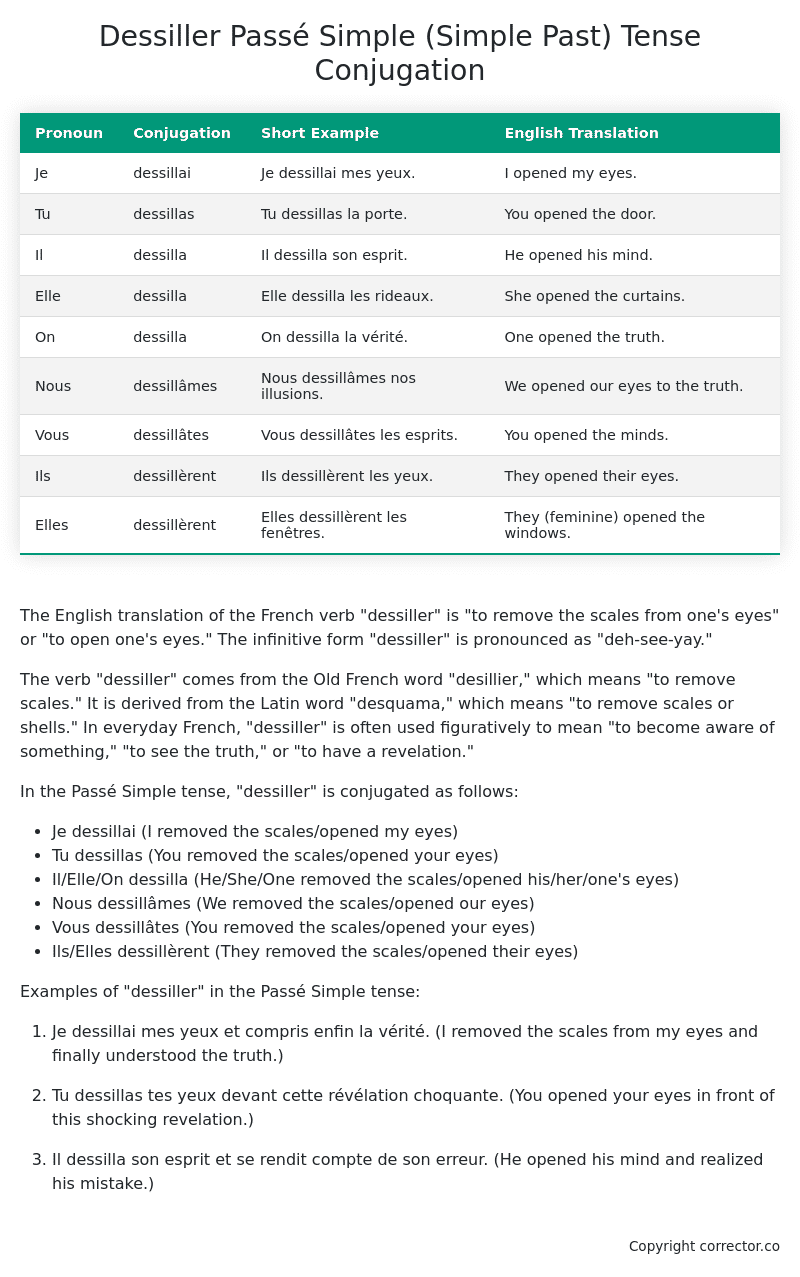Passé Simple (Simple Past) Tense Conjugation of the French Verb dessiller
Introduction to the verb dessiller
The English translation of the French verb “dessiller” is “to remove the scales from one’s eyes” or “to open one’s eyes.” The infinitive form “dessiller” is pronounced as “deh-see-yay.”
The verb “dessiller” comes from the Old French word “desillier,” which means “to remove scales.” It is derived from the Latin word “desquama,” which means “to remove scales or shells.” In everyday French, “dessiller” is often used figuratively to mean “to become aware of something,” “to see the truth,” or “to have a revelation.”
In the Passé Simple tense, “dessiller” is conjugated as follows:
- Je dessillai (I removed the scales/opened my eyes)
- Tu dessillas (You removed the scales/opened your eyes)
- Il/Elle/On dessilla (He/She/One removed the scales/opened his/her/one’s eyes)
- Nous dessillâmes (We removed the scales/opened our eyes)
- Vous dessillâtes (You removed the scales/opened your eyes)
- Ils/Elles dessillèrent (They removed the scales/opened their eyes)
Examples of “dessiller” in the Passé Simple tense:
-
Je dessillai mes yeux et compris enfin la vérité.
(I removed the scales from my eyes and finally understood the truth.) -
Tu dessillas tes yeux devant cette révélation choquante.
(You opened your eyes in front of this shocking revelation.) -
Il dessilla son esprit et se rendit compte de son erreur.
(He opened his mind and realized his mistake.)
Table of the Passé Simple (Simple Past) Tense Conjugation of dessiller
| Pronoun | Conjugation | Short Example | English Translation |
|---|---|---|---|
| Je | dessillai | Je dessillai mes yeux. | I opened my eyes. |
| Tu | dessillas | Tu dessillas la porte. | You opened the door. |
| Il | dessilla | Il dessilla son esprit. | He opened his mind. |
| Elle | dessilla | Elle dessilla les rideaux. | She opened the curtains. |
| On | dessilla | On dessilla la vérité. | One opened the truth. |
| Nous | dessillâmes | Nous dessillâmes nos illusions. | We opened our eyes to the truth. |
| Vous | dessillâtes | Vous dessillâtes les esprits. | You opened the minds. |
| Ils | dessillèrent | Ils dessillèrent les yeux. | They opened their eyes. |
| Elles | dessillèrent | Elles dessillèrent les fenêtres. | They (feminine) opened the windows. |
Other Conjugations for Dessiller.
Le Present (Present Tense) Conjugation of the French Verb dessiller
Imparfait (Imperfect) Tense Conjugation of the French Verb dessiller
Passé Simple (Simple Past) Tense Conjugation of the French Verb dessiller (You’re reading it right now!)
Passé Composé (Present Perfect) Tense Conjugation of the French Verb dessiller
Futur Simple (Simple Future) Tense Conjugation of the French Verb dessiller
Futur Proche (Near Future) Tense Conjugation of the French Verb dessiller
Plus-que-parfait (Pluperfect) Tense Conjugation of the French Verb dessiller
Passé Antérieur (Past Anterior) Tense Conjugation of the French Verb dessiller
Futur Antérieur (Future Anterior) Tense Conjugation of the French Verb dessiller
Subjonctif Présent (Subjunctive Present) Tense Conjugation of the French Verb dessiller
Subjonctif Passé (Subjunctive Past) Tense Conjugation of the French Verb dessiller
Subjonctif Imparfait (Subjunctive Imperfect) Tense Conjugation of the French Verb dessiller
Subjonctif Plus-que-parfait (Subjunctive Pluperfect) Tense Conjugation of the French Verb dessiller
Conditionnel Présent (Conditional Present) Tense Conjugation of the French Verb dessiller
Conditionnel Passé (Conditional Past) Tense Conjugation of the French Verb dessiller
Conditionnel Passé II (Conditional Past II) Tense Conjugation of the French Verb dessiller
L’impératif Présent (Imperative Present) Tense Conjugation of the French Verb dessiller
L’impératif Passé (Imperative Past) Tense Conjugation of the French Verb dessiller
L’infinitif Présent (Infinitive Present) Tense Conjugation of the French Verb dessiller
L’infinitif Passé (Infinitive Past) Tense Conjugation of the French Verb dessiller
Le Participe Présent (Present Participle) Tense Conjugation of the French Verb dessiller
Le Participe Passé (Past Participle) Tense Conjugation of the French Verb dessiller
Struggling with French verbs or the language in general? Why not use our free French Grammar Checker – no registration required!
Get a FREE Download Study Sheet of this Conjugation 🔥
Simply right click the image below, click “save image” and get your free reference for the dessiller Passé Simple tense conjugation!

Dessiller – About the French Passé Simple (Simple Past) Tense
Formation
Usage
Narration
Historical Context
Interactions with other tenses
Passé Composé
Imparfait
Conditional and Subjunctive
Summary
I hope you enjoyed this article on the verb dessiller. Still in a learning mood? Check out another TOTALLY random French verb conjugation!


